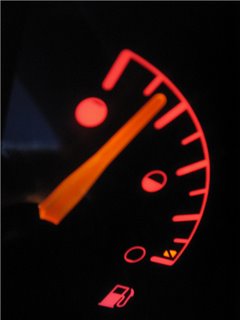Banking on Gas Prices
by Chris Buzzard Consumers across the nation continue to struggle with skyrocketing oil and gas prices, but some have found an answer with the First Fuel Bank. Drivers can buy gas at an agreed upon price, even though they will not consume those gallons immediately. In effect, they have deposited gallons in the fuel bank, which can be “withdrawn” as they see fit.
Consumers across the nation continue to struggle with skyrocketing oil and gas prices, but some have found an answer with the First Fuel Bank. Drivers can buy gas at an agreed upon price, even though they will not consume those gallons immediately. In effect, they have deposited gallons in the fuel bank, which can be “withdrawn” as they see fit.This arrangement sounds like an open-ended forward contract on gas. A forward contract is a two-party agreement to exchange an asset at an agreed upon price at a specific date in the future. However, in this case there is no specified date and an option component allows the consumer to “exercise” this forward incrementally as they wish.
Suppose Brooke, a customer, buys 300 gallons at $3.00 a gallon today. Brooke now has the option to buy gas at $3.00 a gallon at any point in the future. If the current market price dips below $3.00, Brooke will simply buy gas at the current, or “spot,” price and leave her gas bank balance alone. Having this choice makes it sound like holding an option, but Brooke has already paid for the gas and exchange will occur at some future date. This fact makes it more of a forward than an option.
1. The article says there are no additional service fees for the transaction (a $1 lifetime membership fee aside). What incentive do retailers have for selling future gas at today’s prices?
2. If gas prices six months from now hit $3.50, how much does Brooke profit by filling her 15 gallon gas tank and using her “gas account”?
3. Suppose gas prices fall below $3.00 for a couple of years and then rise back to $3.20 in three years. When Brooke taps into her “gas account” to fill up her tank, how much does she profit? Are there additional costs at play here?
4. Retailers are committing themselves to supply gas at potentially very low prices in the future. Is there a default risk on their part?
5. If the current price exceeds your locked-in price, do you always want to use your account, or are there cases where you would go ahead and pay the current price?
Topics: Finance, Gas prices, Forward contracts, Incentives
Labels: Finance, Incentives



0 Comments:
Post a Comment
<< Home